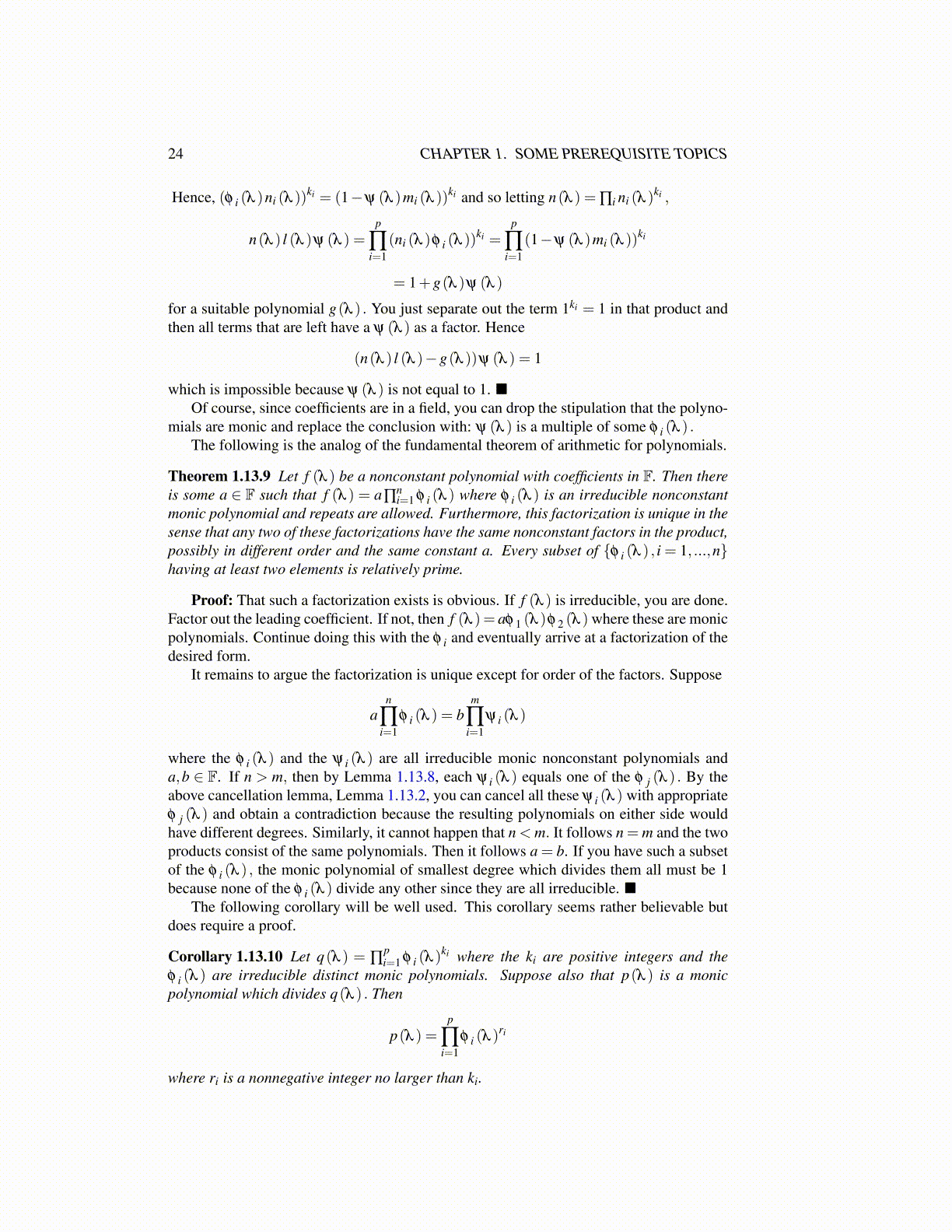
24 CHAPTER 1. SOME PREREQUISITE TOPICS
Hence, (φ i (λ )ni (λ ))ki = (1−ψ (λ )mi (λ ))
ki and so letting n(λ ) = ∏i ni (λ )ki ,
n(λ ) l (λ )ψ (λ ) =p
∏i=1
(ni (λ )φ i (λ ))ki =
p
∏i=1
(1−ψ (λ )mi (λ ))ki
= 1+g(λ )ψ (λ )
for a suitable polynomial g(λ ) . You just separate out the term 1ki = 1 in that product andthen all terms that are left have a ψ (λ ) as a factor. Hence
(n(λ ) l (λ )−g(λ ))ψ (λ ) = 1
which is impossible because ψ (λ ) is not equal to 1. ■Of course, since coefficients are in a field, you can drop the stipulation that the polyno-
mials are monic and replace the conclusion with: ψ (λ ) is a multiple of some φ i (λ ) .The following is the analog of the fundamental theorem of arithmetic for polynomials.
Theorem 1.13.9 Let f (λ ) be a nonconstant polynomial with coefficients in F. Then thereis some a ∈ F such that f (λ ) = a∏
ni=1 φ i (λ ) where φ i (λ ) is an irreducible nonconstant
monic polynomial and repeats are allowed. Furthermore, this factorization is unique in thesense that any two of these factorizations have the same nonconstant factors in the product,possibly in different order and the same constant a. Every subset of {φ i (λ ) , i = 1, ...,n}having at least two elements is relatively prime.
Proof: That such a factorization exists is obvious. If f (λ ) is irreducible, you are done.Factor out the leading coefficient. If not, then f (λ )= aφ 1 (λ )φ 2 (λ ) where these are monicpolynomials. Continue doing this with the φ i and eventually arrive at a factorization of thedesired form.
It remains to argue the factorization is unique except for order of the factors. Suppose
an
∏i=1
φ i (λ ) = bm
∏i=1
ψ i (λ )
where the φ i (λ ) and the ψ i (λ ) are all irreducible monic nonconstant polynomials anda,b ∈ F. If n > m, then by Lemma 1.13.8, each ψ i (λ ) equals one of the φ j (λ ) . By theabove cancellation lemma, Lemma 1.13.2, you can cancel all these ψ i (λ ) with appropriateφ j (λ ) and obtain a contradiction because the resulting polynomials on either side wouldhave different degrees. Similarly, it cannot happen that n < m. It follows n = m and the twoproducts consist of the same polynomials. Then it follows a = b. If you have such a subsetof the φ i (λ ) , the monic polynomial of smallest degree which divides them all must be 1because none of the φ i (λ ) divide any other since they are all irreducible. ■
The following corollary will be well used. This corollary seems rather believable butdoes require a proof.
Corollary 1.13.10 Let q(λ ) = ∏pi=1 φ i (λ )
ki where the ki are positive integers and theφ i (λ ) are irreducible distinct monic polynomials. Suppose also that p(λ ) is a monicpolynomial which divides q(λ ) . Then
p(λ ) =p
∏i=1
φ i (λ )ri
where ri is a nonnegative integer no larger than ki.